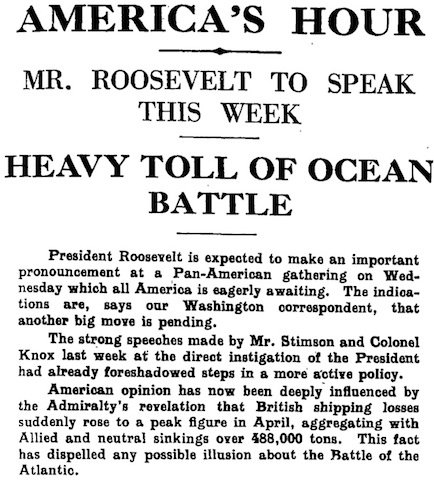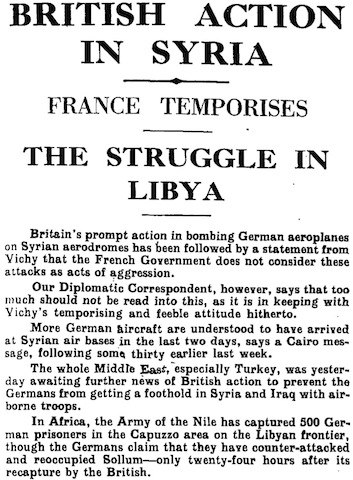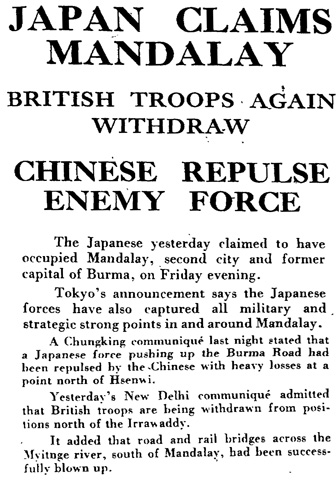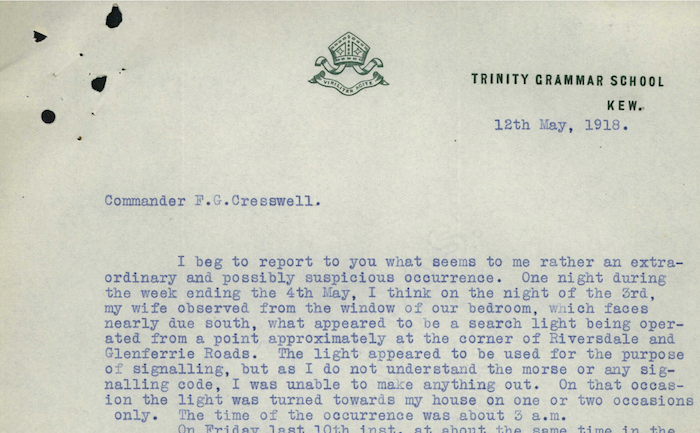
The lead story in the Observer today is one of those not-yet-news stories: an ‘important pronouncement’ on ‘a more active policy’ from President Roosevelt is ‘expected’ (5) on Wednesday. The implication is that this will bring America closer to war one way or another, something ‘more than moral encouragement and material aid’ for Britain. But it’s just speculation, apart from some aggressive speeches made by his secretaries of state and of the navy, though perhaps it is based on some insider information. Who knows? The suggestion is that April’s jump in Allied and neutral shipping losses (488,000 tons total), the highest monthly total for the war so far, has ‘dispelled any possible illusion about the Battle of the Atlantic’. However, the Admiralty points out that 187,000 tons of this total was lost in the recent Mediterranean operations, much of it Greek shipping sunk in Greek ports. So it’s not actually clear that this does represent a new stage in the Battle of the Atlantic. (Still, sunk ships are sunk ships.)
Oliver Stewart, the Observer‘s air correspondent, sees a link between ‘the battle of the Atlantic and the air battle of Britain’ in ‘the fullest use of the airway across the Atlantic’ which ‘enables us to get our bombers and, perhaps eventually, our fighters from the American factories’, which in turn will defend British ports from being damaged by the Luftwaffe. Battle of Britain? Yes, he believes that ‘A second Battle of Britain appears imminent’.
Without in any way minimising the vast size and the disciplined persistence of the Luftwaffe, I think it reasonable to say that the prospects that the Royal Air Force will this time utterly smash the two or three German air fleets launched against it are extremely good.
Stewart does provide some evidence for this in the form of German air losses at night due to RAF fighters: 20 on the night of 7 May, 11 on the following night. The total German losses at night from all causes for May so far is 91, one more than the total for April which was the previous best month for the night defences. Some raids are still taking place by day, too: ‘yesterday a train [in south-east England] was machine-gunned and some of the passengers were wounded’, for example. Presumably, by a second Battle of Britain Stewart means that such daylight raids will soon become very much heavier again.
Like The Times yesterday, the Observer is very concerned about the problems caused by local control of civil defences, particularly with respect to the ‘Battle of the Flames’ (6), as Morrison, the Minister of Home Security, calls the nightly firefighting efforts.
The firemen are magnificent, but the absence of uniformity in the country’s fire services is responsible for many grave breakdowns in times of strain and emergency.
It would like to see each Civil Defence Region have its own ‘executive fire command, led by an officer responsible to the Regional Commissioner’. There would also be a uniform national system of ranks, wages and other working conditions.
Such a reorganisation as this would ensure recognised leadership in the deadliest of Home Front battles, and would end the complaints about equipment that is not interchangeable, reinforcements that go astray through lack of local knowledge or proper guides, and the casting of feeding and relief arrangements on the shoulders of a chief officer already heavily burdened.
Bomber Command’s targets on Friday night included Mannheim and Berlin. The Air Ministry’s communiqué says (5) that at Mannheim,
the attack was concentrated and destructive. Extensive fires were left burning among the docks and in the industrial quarters. A small number of aircraft also bombed objectives in Berlin […] two aircraft of the Bomber Command are missing.
The German official communiqué (which the Observer headlines ‘GERMAN ADMISSIONS’) says that at Mannheim,
Damage was caused in residential districts and fires started in industrial works. They were quickly put out.
Individual planes raided the centre of Berlin. A number of victims were killed or injured among the civilian population.
German night fighters and our A.A. guns shot down five and our naval artillery two British planes.
The Royal Navy has also done some heavy air fighting recently. On Friday its forces in the Western Mediterranean beat off repeated attacks from German and Italian torpedo bombers, level bombers and dive bombers.
In one case a formation of twenty-five dive-bombers escorted by ME 110’s was intercepted and brilliantly broken up and driven off by naval fighters before the attack could materialise.
Anti-aircraft fire also had successes. No British ships were damaged.
On the Russian riddle, the Observer‘s diplomatic correspondent reports that Moscow thinks it ‘unlikely’ that Germany will invade this year. This is mainly because ‘It is an elementary principle of German strategy to avoid a war on two fronts’, but also because it has not yet finished encircling the Soviet Union:
It is, therefore, deduced in Moscow that Germany will not attack Russia until Turkey, Iraq, and Iran are overrun in the south, Sweden and Finland in the north, and Japan in the east.
But Stalin’s assumption of the premiership should be interpreted as a sign that he does not want to be caught off-guard by an invasion. Or perhaps that he ‘may again use his favourite method of staving off a German attack by a spectacular deal with Germany’.
More rationing is on the way. New ration books are to be distributed which will last a year instead of six months as at present, but will have coupons in the back which are to be used ‘for food which may be rationed in future’ (6). This is interpreted as a ‘hint of further rationing’. On the plus side, oranges have successfully run the U-boat gauntlet and are being distributed in Merseyside, Clydeside, Hull and Belfast.
The next few arrivals will similarly be restricted to areas having suffered intensive attack.
Alright for some!
![]() This work is licensed under a Creative Commons Attribution-NonCommercial-NoDerivatives 4.0 International License.
Permissions beyond the scope of this license may be available at http://airminded.org/copyright/.
This work is licensed under a Creative Commons Attribution-NonCommercial-NoDerivatives 4.0 International License.
Permissions beyond the scope of this license may be available at http://airminded.org/copyright/.





